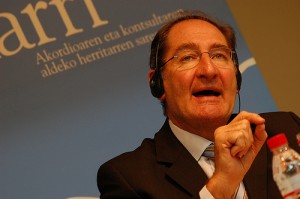When Nobel Peace Prize laureates F.W. de Klerk, Desmond Tutu and John Hume all back an initiative together with the support of the Nelson Mandela Foundation, it is bound to carry some weight. It is also likely to be a project with major international repercussions. But when South African human rights lawyer Brian Currin presented to the European Parliament a resolution backed by the above and another 17 figures from the world of politics and conflict mediation on March 29, the issue at hand was the relationship between the Basque Country, the small region in northern Spain, and Madrid.

The statement sought to contribute to resolving what it called “the last remaining conflict in Europe,” that of the violent Basque separatists of ETA with the Spanish state. Its main thrust was to call on the group to declare a “permanent, fully verified ceasefire.”
But the optimistic nature of this document and its backing by a host of figures who have successfully overseen the end of apartheid in South Africa and the end of the Troubles in Northern Ireland contrasts with the domestic reality of the Basque issue. The reactions of both ETA and the Spanish government made that clear.
While ETA said it welcomed the European Parliament initiative and the “international involvement” that this represented, its response made it sound unwilling to announce a unilateral ceasefire “without guarantees and commitments from all sides.”
The Socialist government, which was so undermined by ETA’s breaking of its previous ceasefire when it killed two people with a bomb at Madrid’s Barajas airport in 2006, is also reluctant to throw its arms around any move which might require it to make concessions to the terrorist group. The Currin statement calls for an “appropriate response” from the government to a putative ceasefire. But any Spanish government would view a new ceasefire suspiciously, as well as fearing being labelled soft on terror. The government’s response to the Brussels statement was extremely low-key, with a spokesman saying that it “offered nothing new.”
Another obstacle to Currin’s admirable plan is the often tribal nature of Spain’s domestic politics, which in recent years has seen the opposition repeatedly use the ETA issue against the Zapatero government. This was illustrated once again recently when Popular Party former minister Jaime Mayor Oreja accused the Socialist administration of having made a cynical pact with the separatists. Mayor Oreja has presented no evidence to back his accusation. However, his meddling potentially damages the delicately balanced –and so far, well-managed– governing partnership in the Basque region between his own party and the Socialists, who have unseated the Basque Nationalists for the first time in the democratic era. Spain’s bitter national political atmosphere, Mayor Oreja has demonstrated, can contaminate any small progress in the northern region.
The drift from Batasuna
A further complication lies in the Basque region itself: the relationship between ETA and its own political support, the izquierda abertzale (literally the “patriotic left”). While divisions have reportedly opened up within the terrorist group in recent years, it also appears to have drifted away from its political arm.
Basque commentator Patxo Unzueta has noted that this has been an inevitable consequence of the Political Parties Law, which declared ETA’s biggest political ally, Batasuna, illegal in 2002. More recently, Batasuna’s representatives have insisted they are committed to achieving peace through democratic and peaceful channels, but their refusal to condemn ETA’s violence has made that impossible in the Spanish government’s eyes.
“The objective is not that Batasuna should condemn ETA, but rather that it manages to ensure ETA withdraws,” wrote Unzueta. Currin is another observer who sees Batasuna’s illegalisation as counter-productive. With Batasuna constantly seeking legitimacy, he believes, it is unlikely to take ETA with it on the road away from violence and towards politics.
The former ETA member Kepa Aulestia highlights this fundamental schism between the terrorist group and the less radical leanings of the izquierda abertzale in describing ETA’s reliance on force.
“The organisation doesn’t have a decision-making mechanism capable of leading it towards the end of terrorism,” he noted. “Instead, it is dominated by an inertia fed by the taboo of even questioning the suitability of the ‘armed struggle’.”
ETA would like its conflict with the Spanish state to be viewed as an issue of international political import, similar to the Ulster peace process. But the group’s complex relationship with its political support is a major hindrance to any such resolution. Madrid’s politicians are effectively hamstrung by the way the last ceasefire ended, and until ETA makes the kind of convincing gesture that contributed to the end of Ireland’s Troubles, this will remain an issue bogged down in Spain’s own gloomy political landscape, however illustrious those who seek to resolve it may be.
I am a spaniard residing in the United States for more than 40 years and therefore I am familiar with national policy toward terrorism. The US goverment does not negotiate with terrorists and the governmet of Spain should't either.
ETA is a terrorist organitation composed of criminals, and as such must be investigated by the police and tried in the judicial courts of Spain.This is the opinion of the inmense majority of the spanish people and their representatives. I consider the intervention in internal spanish affairs by individulas such as Currin as subversion and a threat to our democracy. If Currin and fellow travelers from South Africa want to solve the problemas of the world they should concentrate on Africa which needs a lot of help. A democratic country like Spain does not need their interference. Thanks but no thanks.